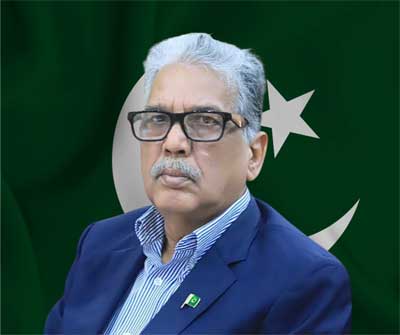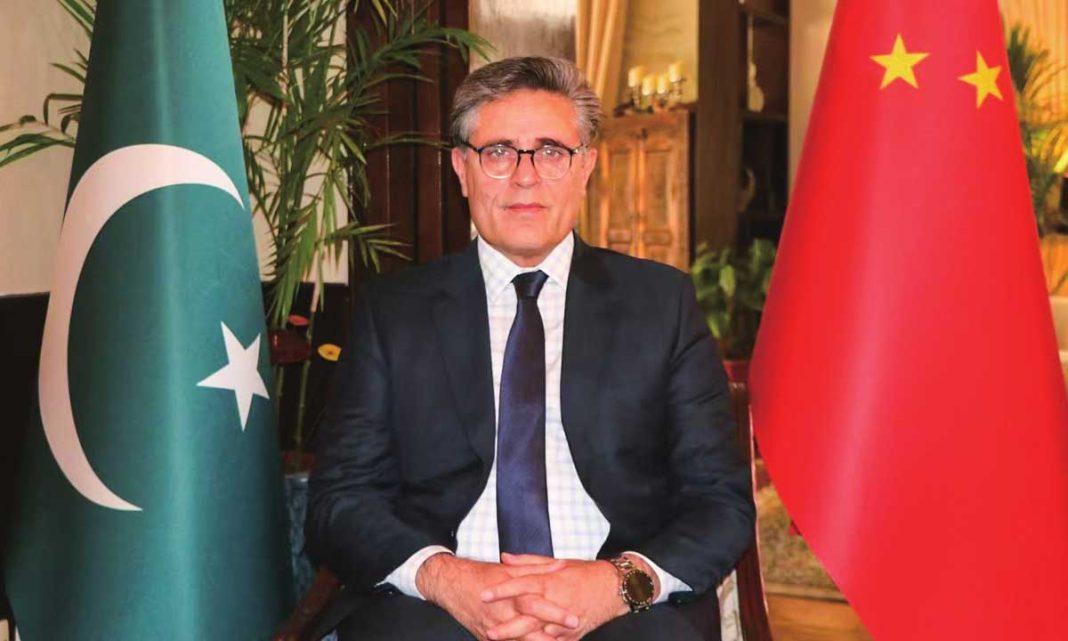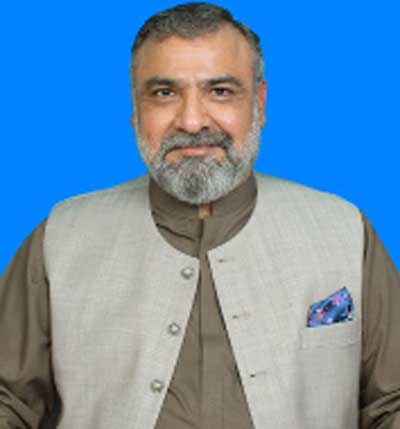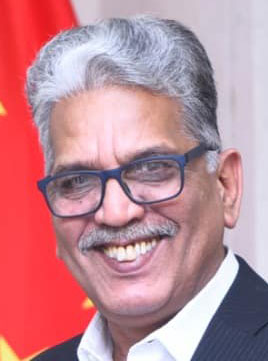

During my recent visit to China, I had the distinct privilege of meeting Pakistan’s Ambassador to China, His Excellency Mr. Khalil Hashmi, in Beijing. It was an excellent and insightful experience that allowed me to witness firsthand the dynamic work being carried out by the Embassy of Pakistan under his remarkable leadership. The Embassy’s tireless efforts and proactive engagement reflect a renewed sense of purpose and professionalism that is truly commendable.
Ambassador Khalil Hashmi is a seasoned Pakistani diplomat with approximately 30 years of experience in both bilateral and multilateral diplomacy. He currently serves as Pakistan’s Ambassador to the People’s Republic of China, having assumed the role in November 2023. He officially presented his credentials to President Xi Jinping in January 2024, marking the formal commencement of his tenure.
Ambassador Hashmi began his diplomatic career in 1994. His early postings included assignments at Pakistan’s embassies in Copenhagen (1999-2002) and Beijing (2008-2010). He has also served twice at Pakistan’s Permanent Mission to the United Nations in New York, including as Deputy Permanent Representative. From November 2019 until his appointment in Beijing, he was Pakistan’s Permanent Representative to the United Nations in Geneva.
In Islamabad, Ambassador Hashmi has held key positions such as Director General of the United Nations, European Region, and Arms Control Divisions, and Director of South Asia, India, and Disarmament Directorates. His extensive experience underscores his commitment to strengthening Pakistan’s diplomatic relations, particularly with China, where he aims to further solidify the strategic partnership between the two nations.
Q: You assumed your role as Ambassador to China in November 2023. How has your experience been so far in Beijing?
A: This is my second stint in Chin. I served here 16 years ago. On both occasions, my experience has been professionally rewarding and personally enriching. Beijing has transformed all these years in remarkable ways especially its environmental protection, as air quality has been improved dramatically; it is a much greener and quieter city, even though traffic volume has increased. Additionally, Beijing has become even more cosmopolitan, vibrant and a happening place.
Serving as Pakistan’s Ambassador to China is a singular privilege, especially given the strategic, historic, and people-centric nature of our bilateral relationship. I have always found a palpable warmth and deep sense of mutual respect. There is an eagerness on both sides to elevate cooperation across new sectors. The depth of engagement, whether political, economic, or cultural, is truly impressive, and continues to grow.
In my current capacity, I have had the opportunity to interact with senior Chinese officials in Beijing, travel across several provinces, meet with local leaders, and engage with businesses and institutions that reflect the diversity and dynamism of China. Each interaction reaffirms the special place Pakistan holds in the hearts of the Chinese people, and the enormous potential that lies ahead for our bilateral partnership.
Q: What were your initial priorities upon taking up this important assignment, and how have they evolved in the past few months?
A: My initial priorities were clear: to further strengthen the political and strategic foundations of our bilateral relationship while injecting greater energy into economic, trade, and people-to-people exchanges. I was also keen to enhance the role of the Embassy as a facilitator of business, innovation, and cultural diplomacy, and to ensure that our community in China is served well and their potential harnessed.
Over the past several months, I have endeavoured to align these priorities with the longer economic, investment of trade trends at the regional and global levels. Therefore, my team and I have paid special attention of directed all efforts to promote high-quality development of CPEC 2.0 and B2B collaboration garnered towards greater Chinese investment through joint ventures. This prioritization is driven by our own assessment of China’s economy and its international trade, by identifying 21 priority sectors where Pakistan has an existing competitive advantage or potential and which can be harnessed with Chinese technology, finance and management practices.
We accordingly planned and organized a business conference in Shenzhen, 6 B2B matchmaking roadshows and four rounds of B2B meetings in Pakistan since last years, resulting in over $1.1 billion worth of contracts and signing of MoUs. I have also paid particular attention to harness opportunities in China in the technology, vocational and agricultural sectors.
In each of these areas, we have organised seminars, forums, and plan establishing standing mechanisms to advance, educational, technology and business activities in a mutually reaffirming manner. Another major area is enhanced outreach and cooperation with dynamic provinces across the expanse of China.
In parallel, we have intensified our engagement with Chinese think tanks, media, and universities, ensuring that our narrative and priorities are well-communicated across the spectrum of Chinese society. These efforts aimed at making the Pakistan-China partnership even more inclusive, future-oriented, and aligned with emerging opportunities in order to build a stronger Pakistan-China Community with a Shared Future in the New Era.
Q: As we celebrate 74 years of diplomatic relations, how would you describe the current state of Pakistan-China ties?
A: Pakistan-China relations are robust and are scaling new heights. Ours is a relationship that has withstood the tests of time, domestic, regionalas well as global challenges.
It is built on the strongest foundations: strategic trust, mutual respect, and an unwavering commitment to each other’s core interests.
This year, we continue to maintain the momentum of high-level strategic communication, coordination and exchanges to accelerate the pace of practical cooperation in both existing and across new domains.
Whether in industrial collaboration, digital connectivity, or cultural engagement, our partnership is on upward trajectory dynamism. Our interactions are both in Beijing and expanding now to include provinces, municipalities, enterprises, and civil societies on both sides.Our defence collaboration, exchanges and practical cooperation continue to strengthen.
In keeping with past traditions, our two countries maintain close coordination, consultation and cooperate at the international and regional organizations, both to safeguard our common interests and to advance the shared priorities of peace, security and development.
Q: What major developments or milestones in Pakistan-China relations would you highlight from the past year?
A: From last May, we have generated and maintained a good momentum of high level visits: Prime Minister Shehbaz Sharif undertook a 3-city visit last June; Premier Li Qiang paid a visit to Pakistan last October, and President Asif Zardari undertook a visit this February.
These high-level visits help inject additional impetus into various streams of our bilateral cooperation. Cumulatively, these three visits yielded substantive joint statements, over four dozen agreements and MoUs in diverse areas ranging from energy, science and technology, agriculture, space, IT, vocational and educational cooperation.
A notable element is the injection of growing momentum on the B2B component in a targeted fashion i.e. in 21 priority sectors by forming joint ventures. Prime Minister’s historic visit to Shenzhen that resulted in over 1000 B2B meetings.
We were able to organise a highly successful Business and Investment Conference in Shenzhen last year during Prime Minister’s visit where 105 Pakistani companies and 250 Chinese companies in the priority sectors were brought together. In a historic first, we organized over 1000 meetings in one day and resulted in over 30 MoUs. We planned and organised 6 additional B2B roadshows in textile and apparel, leather and footwear, fisheries, fruits and vegetables, medical and surgical equipment and plastics that led to 45 MoUs valuing over $600 million.
We have now planned 8 B2B roadshows in China this year in Electrical Vehicles (EV), Solar Panels, ICT (Software Development), ICT (BPO), Steel & Copper, Chemical and Petrochemicals, Financial Services, and Food Processing.
So on the economic side, we saw increased momentum in bilateral economic discussions, and B2B initiatives, including sector-specific engagements in textile, energy, and mining. The interest shown by Chinese companies in relocating manufacturing and exploring partnerships is a tangible reflection of growing investor confidence.
We also saw the conversion of Khunjerab border into an all-weather crossing, serving as a major step for enhanced trade, transit, tourism and people-to-people exchanges.
Space cooperation made many strides with the landmark PakSat-MM1 being launched and the agreement by both our sides to send a Pakistani astronaut aboard China’s space mission. Additionally, defence collaboration remained strong and robust. On the people-to-people front, the revival of cultural diplomacy and education exchange programs has been encouraging.
Q: What steps are being taken to increase Chinese investment in Pakistan’s industrial and agricultural sectors?
A: We are focused on several aspects to promote Chinese investment in 21 sectors prioritized by us which also include industrial and agriculturalsectors. These steps include awareness raising, facilitation, organisation of B2B roadshows and hand-holding. I have outlined steps taken to advance B2B interactions and joint ventures. We provide information and guidelines as well as data to help Chinese and Pakistani companies to review their businesses and investment proposition. We work with authorities and institutions back home for one-window mechanism to streamline decision-making and fast-track approvalsespecially investors from China.
On the industrial side, we are offering sector-specific investment packages in areas such as electronics, textiles, and automotive parts. We are also working closely with Chinese provinces like Guangdong and Shandong to match Pakistani production capacity with Chinese demand and relocation potential. The growing interest in SEZs is proof that our message is being received positively.
In agriculture, we are promoting modern joint ventures in seed technology, irrigation systems, cold-chain logistics, and food processing. Chinese firms have shown keen interest in fisheries, seafood, and meat. With aligned sanitary and phytosanitary protocols and better connectivity, these investments can significantly boost our exports while introducing cutting-edge management practices in Pakistan.
Q: China is a global leader in technology and innovation. How can Pakistan benefit from deeper cooperation in this domain?
A: China indeed is a global leader in several areas of technology, both in terms of traditional and new technologies. We are making efforts to harness the immense opportunities that China offers in these fields. Briefly, we are pursuing a three-tiered approach, i.e. education, research and business.
On the educational side, our effort is enhance opportunities for undergraduate students from Pakistan to pursue studies in I.T. and new technology disciplines along with learning of Chinese language. The research streams are also exploring awareness to deepen joint research projects and labs. And on the business side, we are organizing B2B roadshows between Pakistani and Chinese enterprises in both existing and emerging technologies.
We are also working on establishing a standing Forum on Technology, a concept paper on which has been shared with the Chinese side. Additionally, we have set up a Pakistan Study Center at Shenzhen University which would inter alia promote the three tracks of education, research and business ideas.
We are encouraging Chinese tech firms to explore partnerships in Pakistan’s start-up ecosystem, digital infrastructure development, and e-governance platforms. The successful launch of the PakSat-MM1 satellite with Chinese collaboration marks a significant leap in our telecommunications and space capabilities, and paves way for deeper cooperation in high-tech domains.
Moreover, as China shifts focus towards development of New Quality Productive Forces, Pakistan offers a complementary environment for research, prototyping, and localized production in key sectors. With the right alignment of industrial policy, Pakistan can serve as a reliable innovation partner and regional tech hubwith Chinese support playing a catalytic role.
Q: Are there any upcoming partnerships in IT, green energy, or AI between the two countries?
A: Yes, we are actively working on fostering partnerships in IT, green energy, and artificial intelligence, areas that are central to Pakistan’s development goals and China’s global leadership. A number of Chinese tech firms have shown interest in exploring Pakistan’s emerging digital ecosystem.
In the green energy space, cooperation is expanding beyond large hydropower to include solar, wind, and coal-to-chemical initiatives. Chinese enterprises are exploring both brownfield and greenfield investments, and recent interactions have focused on building integrated industrial solutions around renewable energy, especially in the context of Special Economic Zones and urban centres.
In AI, we are in the early stages of forming academic and industry-led research partnerships. The goal is to localize AI applications in agriculture, public service delivery, and industrial automation. We are confident that Pakistan-China collaboration in these future-defining domains will not only bring economic value but also further deepen our bilateral bonds of friendship.
Q: What is the current status of the Pakistani community in China, especially students and professionals? How is the Embassy supporting them?
A: The Pakistani community in China is vibrant and diverse, comprising students, researchers, professionals, entrepreneurs, and families. China is the largest overseas destinations for Pakistani students which as of this year stand at 29,000. Our students, particularly in engineering, medicine, and language studies, continue to excel in their academic pursuits, and many have become cultural ambassadors of Pakistan in their own right. Professionals in sectors such as IT, banking, and education are also making valuable contributions.
The Embassy maintains close contact with the community through regular outreach, welfare support, and cultural events. Besides the regular interactions, we have launched a Professionals and Students Forum. Two editions have been held so far, with last year’s event advanced networking between academia and industry, while in this year’s edition welaunched a special Mentorship Program for Pakistani students to provide them insights on how to join China’s job market.
Our goal is to strengthen community cohesion and ensure that every Pakistani in China feels heard, valued, and supported. We also encourage the community to serve as a bridge. Building trust, and amplifying the story of Pakistan-China friendship through daily interactions.
Q: How does the Embassy facilitate Pakistani businesses and entrepreneurs who wish to explore the Chinese market?
A: Supporting Pakistani businesses is one of our core functions. The Embassy, along with our Consulates, provides tailored guidance to entrepreneurs looking to access the Chinese market, whether through trade fairs, B2B matchmaking, product registration support, or helping navigate the regulatory landscape. We actively identify market opportunities in provinces aligned with Pakistan’s export strengths.
We also work to resolve logistical and compliance challenges by coordinating with Chinese authorities and trade facilitation platforms. The launch of the China-Pakistan Business and Investment Forum has added fresh momentum to these efforts.
Additionally, we are promoting the digital integration of Pakistani products through Chinese e-commerce platforms, and working with chambers of commerce to raise awareness about quality standards and branding. The goal is to shift from transactional trade to long-term partnerships, while improving Pakistan’s market visibility in China.
Q: How do you view the role of Pakistan-China relations in the evolving regional and global geopolitical context?
A: Pakistan-China relations are a source of stability, balance, and a good model of longstanding inter-state relations grounded in principles of mutual trust, support and benefit. Our relationship is not aimed against any third party: insteadit is focused on promoting peace, development, and regional connectivity.
China has been a consistent supporter of Pakistan’s sovereignty, national independence, territorial integrity and mutual development. Likewise, Pakistan supports China’s core interests and its pursuit of visionary policies through platforms such as the Belt and Road Initiative and the Global Development Initiative. Pakistan-China collaboration at the United Nations, SCO, and other international fora reflects a convergence of worldviews, centredon inclusivity and fairness.
As global fault lines deepen, Pakistan and China will continue to play a positive role in advocating dialogue over division, and development over confrontation. Our relationship will further deepen enabling the two countries to closely communicate and coordinate in safeguarding our respective interests while promoting a UN-centric, and fair global order, sustainable development and unfinished security for all citizens.
Q: In what ways can both countries further collaborate on international platforms to promote shared interests?
A: Both Pakistan and China already consult, coordinate and cooperate extensively on global platforms to address common interests. Both countries share a commitment to reforming global governance structures, enhancing the voice of the Global South, and ensuring that multiple policies on sustainable development that are inclusive and responsive. Both countries, are strong partners in amplifying these messages at the UN, G77, SCO, and other forums.
Counting climate change, financing for development, development of regulatory areas for AI are some of the areas where our collaboration can be further enhanced.
Q: What has been the most memorable moment or achievement of your tenure so far?
A: It is difficult to choose just one, given how rich and multidimensional this assignment has been. But if I were to highlight a particularly meaningful moment, it would be the outcome of the Prime Minister’s visit to Shenzhen last years and launch of the transformative journey of promoting Chinese investment in Pakistan in 21 sectors identified by the Embassy.
Equally memorable have been my visits to Chinese province where I’ve seen first-hand the admiration and respect ordinary Chinese citizens hold for Pakistan. Even in the smallest of towns, faces light up when they hear that I am from Pakistan and the first word people say is “Ba tie” – a term that is solely reserved for Pakistan and translated into Iron Brothers.
Engaging with provincial leaders, local entrepreneurs, and students, I have sensed the deep emotional resonance of our friendship beyond formal settings. It reminds me that our bond is not confined to government offices, it lives in the hearts of our peoples.
My visit to Pakistan-China border last year all the way from Kashgar was a memorable experience.
On a personal note, every opportunity to interact with the Pakistani community in Chinahas been incredibly rewarding. Whether it is students excelling in Chinese universities or professionals making their mark, they represent the promise of our future. Supporting and encouraging them has been a deeply meaningful part of this journey.
Harnessing Pakistan brand in China for enhanced trade and investment-led economic growth through partnership with provinces in China is both rewarding and remains one of my priorities.
Q: What message would you like to convey to the people of Pakistan and China on this 74th anniversary?
A: That our relationship is a invaluable treasure that has been carefully nurtured over decades, through hard work, by fostering trust, by pursuing shared struggles, and demonstrating unwavering solidarity.
As we mark 74 years of diplomatic relations, let us celebrate not just the proud history of support that we share, but a promoting future of prosperity we are shaping together. This bond is a source of pride for both our nations, and a symbol of what enduring, principled friendship can achieve.
At a time when our region and the world at face many uncertainties, Pakistan-China partnership stands tall as a force for peace, stability, win-win cooperation, and sustainable development. We are determined to further deepen this relationship in every sphere of our public life. Let us carry this spirit forward to the 75th anniversary next year, and beyond.
I would also encourage our younger generations to take ownership of this legacy, to learn from it, and to enrich it with new energy and ideas. The future of Pakistan-China relations lies not just in the bonds of leaders and diplomats, it very much resides in classrooms, labs, businesses, and communities. Let us build it together.
Q: Anything which you’d like to add, please.
A: Pakistan-China relationship is unique, time tested and friendship of all weathers, seasons and time. Our two countries have demonstrated the veracity of these phrases. Our leaders and diplomats have done a remarkable job of sustaining it across generations. That said its future strength will depend on how we shape and foster it while navigating new realities, new challenges, and new opportunities. Whether in green development, digital innovation, cultural diplomacy, or public health, the opportunities are limitless and my team and I are fully devoted to harness these.
The Embassy remains committed to serving as a bridgeconnecting people, ideas, and institutions across both countries. We are constantly working to ensure that this relationship delivers tangible benefits to our citizens, from Gwadar to Kashgar and beyond.
Lastly, I wish to express my deepest appreciation to our Chinese friends across China and beyond for their consistent support, generosity, and friendship, and to the people of Pakistan for their belief in the enduring value of this partnership. As we look to the future, let us remain confident, focused and united in realizing our shared vision of peace, prosperity and a Pakistan-China community with a shared future in the new era.




